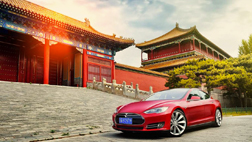Automakers Plead With China to Delay EV Mandates
![]() Print this Article | Send to Colleague
Print this Article | Send to Colleague
 On the surface, the recent push by the Chinese government to mandate the production of electric vehicles to help stimulate its economy while it also helps to clean the air in many of its highly populated cities seems like a boon to EV-producing automakers.
On the surface, the recent push by the Chinese government to mandate the production of electric vehicles to help stimulate its economy while it also helps to clean the air in many of its highly populated cities seems like a boon to EV-producing automakers.As reported by Power Engineering International, a group of those advantaged makers recently implored the Chinese government to back off its frenzied push for battery-electric vehicles because these companies are unable to meet the timelines in the new regulations. In a letter sent in June to China’s Ministry of Industry and Information Technology, the makers asked China to delay and soften planned quotas for sales of electric and hybrid cars, saying its proposals will be impossible to meet and would severely disrupt their businesses, according to Reuters.
China wants electric and plug-in hybrid cars to make up at least a fifth of Chinese auto sales by 2025, with a staggered system of quotas beginning in 2018.
"The proposed rules’ ambitious enforcement date is not possible to meet," the letter from U.S., European, Japanese, and Korean auto industry bodies said, according to Reuters.
"At a minimum, the mandate needs to be delayed a year and include additional flexibility."
To complicate matters, dozens of countries also signed a pledge to make EVs 30 percent of new vehicle sales by 2030. If they can’t meet the demands of the world’s largest car market, the entire world wanting EVs is going to be disappointed.
However, the new standards also play an additional role. Aside from the noble endeavor of cleaning the pollution-choked air in the cities, the move is also designed to give China’s indigenous automakers a leg up in that competition.
In addition to leveling the playing field a bit against the more established foreign makers in the country, the new rules invoke harsh penalties for non-compliance, including the cancellation of licenses to sell non-electric cars in China. Getting slapped with that penalty would be highly problematic some automakers in the market.
"This will hit the industry pretty hard, especially well-known companies," Liping Kang, senior manager at the Innovation Center for Energy and Transportation, a Beijing-based think tank, told Reuters.
Many of the non-Chinese automakers have recently made significant public commitments to produce EVs in China. Tesla recently confirmed it was heavy in talks with the government to build a facility in Shanghai to produce EVs. Daimler announced it was investing $735 million into a plant to expand its EV battery production. General Motors and Ford have also announced plans to expand EV sales and production in China in recent months.

